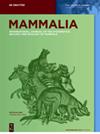Molecular detection of Leptospira and Bartonella in Mastomys natalensis and its ectoparasites in Morogoro, Tanzania
IF 0.8
4区 生物学
Q3 ZOOLOGY
引用次数: 0
Abstract
Abstract Rodents play an important role in the transmission of zoonotic diseases. This study investigated the prevalence of Leptospira spp. and Bartonella spp. in Mastomys natalensis and its ectoparasites (fleas and mites) in selected villages of Morogoro, Tanzania. Mastomys natalensis were captured live in fallow habitats using Sherman® traps and anesthetized using Halothane. Blood samples were obtained from the retroorbital sinus Ectoparasites were removed from the fur using a hard brush and preserved in 70 % ethanol. Real time–qPCR was used to detect Leptospira spp. and Bartonella spp. from Mastomys natalensis blood and ectoparasites respectively. The study revealed a relatively larger number of males than females captures. Leptospira spp. was demonstrated in one out of 100 Mastomys natalensis. For Bartonella spp., prevalence of (14 %) was recorded in mites with a higher proportion in mites from adult male Mastomys natalensis than females. Upon Sanger sequencing, four positive samples showed a complete sequence of the ITS gene. Indicating that all samples belonged to Uncultured Bartonella. Low prevalence of Leptospira spp. and a high prevalence of Bartonella spp. was observed in Mastomys natalensis. Further exploration of rodent pathogens is recommended to raise awareness of the role of commensal rodents in disease transmission via their ectoparasites.坦桑尼亚莫罗戈罗地区纳塔利Mastomys natalensis及其体外寄生虫钩端螺旋体和巴尔通体的分子检测
摘要啮齿动物在人畜共患疾病的传播中起着重要作用。本研究调查了坦桑尼亚莫罗戈罗村natalensis中钩端螺旋体和巴尔通体及其外寄生虫(跳蚤和螨)的流行情况。使用Sherman®诱捕器在休居地捕获Mastomys natalensis,并使用氟烷麻醉。从眶后鼻窦采集血液样本,用硬毛刷去除皮毛上的外寄生虫,并用70 %乙醇保存。采用Real - time-qPCR技术分别检测纳塔利乳螺血液中的钩端螺旋体和体外寄生虫中的巴尔通体。研究显示,捕获的雄性比雌性的数量要多。钩端螺旋体在100个Mastomys natalensis中被证实为1个。巴尔通体在螨体中的流行率为(14 %),其中成年雄斑腹螨的比例高于雌斑腹螨。经Sanger测序,4个阳性样本显示ITS基因的完整序列。说明所有样本都属于未培养的巴尔通体。钩端螺旋体感染率低,巴尔通体感染率高。建议进一步探索啮齿动物病原体,以提高人们对共生啮齿动物通过其体外寄生虫传播疾病的作用的认识。
本文章由计算机程序翻译,如有差异,请以英文原文为准。
求助全文
约1分钟内获得全文
求助全文
来源期刊

Mammalia
生物-动物学
CiteScore
2.20
自引率
10.00%
发文量
68
审稿时长
6-12 weeks
期刊介绍:
Mammalia is an international, multidisciplinary, bimonthly journal devoted to the inventory, analysis and interpretation of mammalian diversity. It publishes original results on all aspects of the systematics and biology of mammals with a strong focus on ecology, including biodiversity analyses, distribution habitats, diet, predator-prey relationships, competition, community analyses and conservation of mammals. The journal also accepts submissions on sub-fossil or recently extinct mammals.
 求助内容:
求助内容: 应助结果提醒方式:
应助结果提醒方式:


